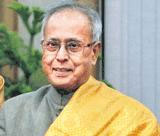
Patna/New Delhi, June 20: Struggling to find a candidate of its own to contest the presidential election, the BJP-led NDA found itself in acute embarrassment on Tuesday as alliance partner Shiv Sena came out openly in support of the UPA nominee Pranab Mukherjee.
Sena supremo Bal Thackeray made known his party position through party mouthpiece Saamna: “Let bygones be bygones. Let us unanimously support Pranab Mukherjee and show the world that “hum sab ek hai” (we are all united).
Thackeray’s stand came a day after Mukherjee telephoned him and his son Uddhav seeking support for his candidature.
The Sena statement has come as a jolt to the NDA as BJP has been desperately trying to put up a fight against Mukherjee. The coalition suffered a setback on Monday as former president A P J Abdul Kalam declined to contest despite strong efforts made by BJP veteran L K Advani.
Another NDA ally, the JD(U) is also in favour of a consensus on Mukherjee. The saving grace for the NDA is that the Bihar party has not gone public.
With Sena gone out of the NDA as far as presidential elections are concerned, the BJP is now doing evaluating supporting the candidature of P A Sangma, who is insisting on remaining in contest. BJP is not sure which way JD(U) will behave if it insists on the Sangma candidature. The NCP, a UPA partner, on Tuesday expressed confidence that party leader Sangma will opt out of race for Presidential elections and ultimately support Mukherjee.
“He (Sangma) is a senior leader. We are meeting on June 21 and he will attend the meeting. We are confident he will support the UPA candidate,” said NCP general secretary D P Tripathi after meeting Pranab Mukherjee.
Asked about his meeting with Pranab Mukherjee, he said: “It was a courtesy call. We are an ally of UPA, so I came to meet him”.
Hailing Mukherjee as the “right candidate”, Thackeray said : “The farce that is on for the top post of President is not justifiable. The country’s prestige is at stake for political gains. Those who have no merit are also in the race.”




Comments
Add new comment